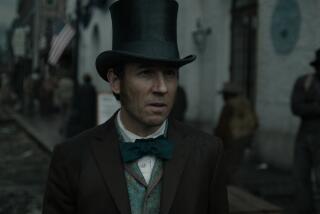‘Bridge of Spies’: Can it head to ‘Lincoln’ levels?
Every once in a while, it’s worth looking at how a movie has done at the box office, not just compared to other films that happened to open that weekend, but in the context of other films by the same director. Or at least it’s worth doing that in the case of Steven Spielberg, who, among other achievements, has two of the top seven grossing movies of all time when adjusting for inflation.
This weekend saw the opening of Spielberg’s “Bridge of Spies,” starring Tom Hanks as a 1960s-era lawyer-turned-diplomatic-savior, James Donovan. The fact-based Cold War drama, which has been embraced by critics, performed decently enough, taking in $15.4 million, or a $5,470 average across its nearly 3,000 screens. And so the question: Where does it go from here?
SIGN UP for the free Indie Focus movies newsletter >>
With wide releases typically grossing between two and three times their opening weekend receipts, that should put “Spies’” total under $50 million -- not exactly at the high end for Spielberg.
Except that standard multiple rules may not apply here. Spielberg’s last movie, 2012’s “Lincoln,” opened to $21 million but went on to gross $182 million, his highest non-sequel total since the 1990s. And there are reasons to expect similar results from “Lincoln” and “Spies.” The movies share plenty of commonalities -- they’re both talk-heavy dramas based on notable aspects of American history, they both center on a principled man who finds a way to navigate a tangled system, and they both contain heavily procedural elements (legislative in “Lincoln’s” case, diplomatic for “Spies”).
That would bode well for “Spies.” Like “Lincoln,” the movie is also an old-fashioned drama, which means it will bring in more mature audiences who aren’t likely to run out at the start. Awards notice awaits too, which always helps.
But it’s also a tough road. “Lincoln” came out of the gate faster, with nearly double the per-screen average on its first wide weekend. It also had a recognizable subject and a transformative central performance that kept the movie going, and going, and going some more with audiences. (It was still taking in $5 million well into its third month of release.)
There’s another X factor: “Spies” can appear to be, and is in fact packaged like, a thriller. That could bring people in. But since it doesn’t play exactly like a thriller -- it contains fairly few narrative surprises and is less about what will happen than how it happens -- the word of mouth among some audiences could be more mixed, slowing its momentum.
Spielberg movies tend to fit into two categories. There’s the trademark grand entertainment, “Jaws” and “Close Encounters” and “E.T.,” for which we first came to know him. And then there’s the serious historical movie, the “Saving Private Ryan” and “Schindler’s List”-type efforts that gained him notoriety later.
The filmmaker has doubtless been in a serious era of late. After a 2000s period in which he made mainly big entertainment (“War of the Worlds,” “Minority Report” and “Indiana Jones and Kingdom of the Crystal Skull”), his last three movies (“Spies,” “Lincoln” and “War Horse”) have been set in the middle of a war and deal with more grave themes.
Among the serious-movie subset, “Lincoln” and “Ryan” are some of the box-office high points (the latter’s $216 million translates to $384 million in today’s dollars). The other end? “Munich” and “Amistad,” neither of which reached $80 million in today’s dollars. “War Horse,” too, garnered just $80 million in 2011.
“Spies,” which immediately follows “Lincoln” and whose filmmaking has been compared to “Saving Private Ryan,” has aspirations to make a run in those movies’ direction. But plenty of work and new moviegoers must lie ahead if it’s to get there.
Twitter: @ZeitchikLAT
More to Read
Only good movies
Get the Indie Focus newsletter, Mark Olsen's weekly guide to the world of cinema.
You may occasionally receive promotional content from the Los Angeles Times.









